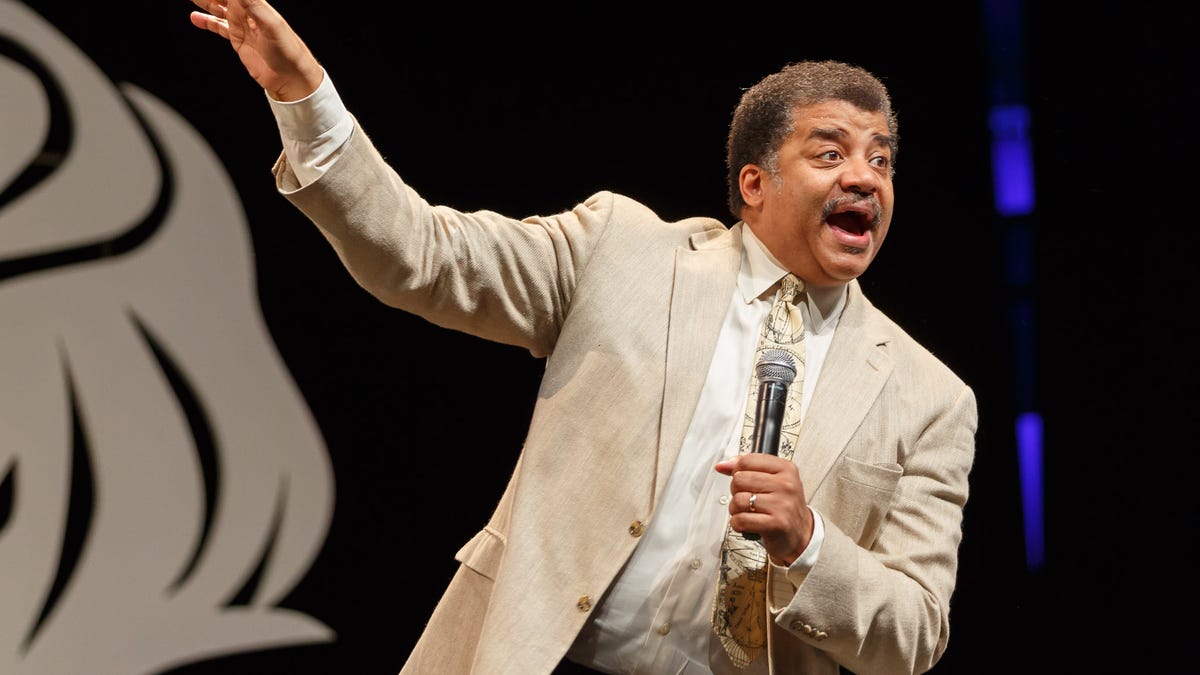Neil DeGrasse Tyson: US need not lose its edge in science
The famed astrophysicist says there's a reason some chemical elements are named for places in the US -- and that we don't have to leave those glory days in the past.

Neil DeGrasse Tyson speaking at the Cannes Lions conference.
CANNES, France -- The US today is sacrificing its scientific excellence just as the Arabic world did a millennium earlier, but it's not too late for the country to make science a cultural priority.
That's what famed astrophysicist Neil DeGrasse Tyson told advertising and marketing specialists at the Cannes Lions conference here. That audience may have been a bit removed from the science types for whom Tyson has long been a celebrity, but his fame, cemented this year with the popular TV series "Cosmos: A Spacetime Odyssey," transcends those cultural boundaries. Tyson groupies descended upon the stage to get autographs and ask questions, and the audience lauded his speech Thursday with a standing ovation.
In particular for a large swath of students in the audience, Tyson is becoming something of a hero, and they're receptive to his attempts to encourage STEM programs focused on science, technology, engineering, and mathematics.
"Investments in those areas can transform a complacent country into an innovation nation," Tyson said. It's an edge the US is losing as Europe and Japan produce ever-larger fractions of the world's published, peer-reviewed scientific papers, with China growing fast, too, he said.
The US gained prominence in the 20th century with a massive push behind scientific research -- a capability that, among other things, meant only five years separated the discovery of plutonium in 1940 and its use as a weapon at the end of World War II in 1945.
"The US valued research in physics, driven by war," Tyson said. The names of other transuranic chemical elements reflect the US prowess: californium, berkelium, and americium. "When you discover something, you get you name it. It displays for you your imprint on the history of knowledge, thought, and innovation."
A country's cultural priorities show in the names lionized on its currency, and Tyson showed off a dozen examples of countries praising their native scientists like Nikola Tesla, Guglielmo Marconi, Alexander Volta, Charles Darwin -- and in Israel's case of Albert Einstein, the native scientists of other countries, too.
"Somebody's caring about the discoveries this man made enough to share it," he said. "It's a natural part of being alive. These are the things that affect your culture. Whole countries can be given to problem-solving."
Neil DeGrasse Tyson speaks of the US' glory years of scientific research in the 20th century, when it discovered many new elements.
One cultural shift a thousand years ago turned the huge Islamic region of the world from the scientific center of the world to a backwater. From about 800 to 1100 in the Islamic world was "one of the most intellectually fertile periods in the history of the human species," Tyson said, producing among other things algebra and the Arabic numerals in use globally today.
But a Muslim cleric, Hamid al-Ghazali, undid that with Islamic conclusions that "manipulating numbers is outside of your spiritual responsibilities and that all the events around you are the will of Allah," Tyson said. The casualties were mathematics and curiosity about how the universe works. If you're content with an explanation that the world works the way it does because God made it that way "you'll not be the one who discovers gravity," he said.
That Islamic legacy persists. There are only about 15 million Jews in the world, but they have received 25 percent of science Nobel prizes. Islamic scientists have won just 3 of the 609 science Nobel prizes so far issued, even though they account for about 2 billion of the world's 7 billion people.
"I lie awake at night asking how myself how many secrets of the universe lay undiscovered because 2 billion people are not participating in that exercise," Tyson said. "What problems are not being addressed because of the intellectual power not being applied to that?"
Astrophysicist Neil DeGrasse Tyson bemoans scientific and mathematical illiteracy in the US government.
Now the US risks following down that path because of underinvestment in science ever since Western nations came out on top after the Cold War. "When the [Berlin] Wall came down, science got viewed as a luxury," he said.
"I do know in the US we're losing it. There's something going on," he said. "When I think of the major contributions the US made to our civilization and culture in the 20th century -- I now see this: a headline that says, 'Half the schools in the district are below average.' This is the country I hail from."
Tyson has some shreds of optimism. His own show has helped, he thinks.
As evidence, he pointed to a tweet by @Foodmancing that arrived five minutes before the first episode of the TV show: "Shhhh @neiltyson is about to crack a knowledge egg on your ass #cosmos."
"It was science literacy reaching into the vernacular," Tyson said. "People felt compelled to comment in their own way."

